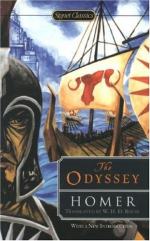’Old man, thou hast no lack of skill in tending a garden; lo, thou carest well for all, {*} nor is there aught whatsoever, either plant or fig-tree, or vine, yea, or olive, or pear, or garden-bed in all the close, that is not well seen to. Yet another thing will I tell thee and lay not up wrath thereat in thy heart. Thyself art scarce so well cared for, but a pitiful old age is on thee, and withal thou art withered and unkempt, and clad unseemly. It cannot be to punish thy sloth that thy master cares not for thee; there shows nothing of the slave about thy face and stature, for thou art like a kingly man, even like one who should lie soft, when he has washed and eaten well, as is the manner of the aged. But come declare me this and plainly tell it all. Whose thrall art thou, and whose garden dost thou tend? Tell me moreover truly, that I may surely know, if it be indeed to Ithaca that I am now come, as one yonder told me who met with me but now on the way hither. He was but of little understanding, for he deigned not to tell me all nor to heed my saying, when I questioned him concerning my friend, whether indeed he is yet alive or is even now dead and within the house of Hades. For I will declare it and do thou mark and listen: once did I kindly entreat a man in mine own dear country, who came to our home, and never yet has any mortal been dearer of all the strangers that have drawn to my house from afar. He declared him to be by lineage from out of Ithaca, and said that his own father was Laertes son of Arceisius. So I led him to our halls and gave him good entertainment, with all loving-kindness, out of the plenty that was within. Such gifts too I gave him as are the due of guests; of well wrought gold I gave him seven talents, and a mixing bowl of flowered work, all of silver, and twelve cloaks of single fold, and as many coverlets, and as many goodly mantles and doublets to boot, and besides all these, four women skilled in all fair works and most comely, the women of his choice.’
{* Supplying [Greek] from the preceding clause as object to [Greek]. Other constructions are possible.}
Then his father answered him, weeping: ’Stranger, thou art verily come to that country whereof thou askest, but outrageous men and froward hold it. And these thy gifts, thy countless gifts, thou didst bestow in vain. For if thou hadst found that man yet living in the land of Ithaca he would have sent thee on thy way with good return of thy presents, and with all hospitality, as is due to the man that begins the kindness. But come, declare me this and plainly tell me all; how many years are passed since thou didst entertain him, thy guest ill-fated and my child,—if ever such an one there was,—hapless man, whom far from his friends and his country’s soil, the fishes, it may be, have devoured in the deep sea, or on the shore he has fallen the prey of birds and beasts. His mother wept not over him nor clad him for burial,




